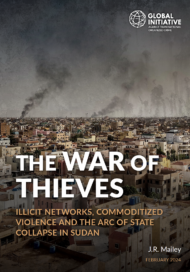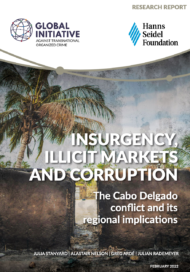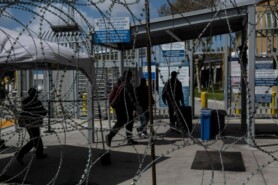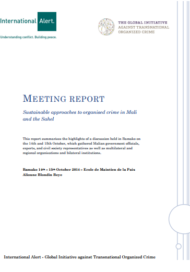Networks of powerful, politically connected criminal actors have created an enabling environment for an Islamic insurgency in northern Mozambique that is terrorizing local communities and threatening the country’s stability.
Long before the violence began, the locals had been pleading with Maputo to pay attention to their plight. In the sleepy fishing village of Mocímboa da Praia, in the north of Cabo Delgado Province, they said an Islamist group had established itself in the area. They were taking control of the mosques, or establishing their own, they said, and preaching an anti-state ideology and a strict version of Islam at odds with local values.
Muslim and Christian community members alike expressed their concern. They said they believed the group was violent – though, at that point, they conceded, unarmed. Because of their extremist ideology, rather than any obvious signs of their affiliation, the locals call them ‘al-Shabaab’. The government, which controls Mozambique’s largest media company, tried to impose a news blackout on the group’s activities.
The violence in Mocímboa da Praia has escalated rapidly and alarmingly since it broke out in October 2017. The group, which calls itself Ansar al-Sunna, has launched a series of deadly attacks on state structures and civilians. The government has reacted with swift and aggressive operations – interventions that have failed to restore peace to the area.
People who live in these northernmost areas of Mozambique are afraid. Civilians have been targeted by Al-Sunna; hundreds of local men have been arrested by state authorities; whole villages have been displaced by the violence. People are concerned about their future. What if the violence escalates even further? What if Al-Sunna, with its emphasis on violent anti-authoritarianism and an opposition to women’s rights – which are not tenets of local Islamic practices – were to take root in this part of Mozambique? What if this group were to begin attacking oil and gas installations, wiping out revenue that is critically needed by the impoverished and indebted state? And what if these attacks became the pretext for harsh state repression of opposition figures or dissenters?
The Global Initiative’s research in the region has turned up several reasons to be worried about a descent into further instability, violence and repression – research that wasn’t even focused on the Mocímboa da Praia crisis. Instead, we were investigating the integration of criminal economies East and southern Africa. This research looked at the phenomenon of how heroin originating in South Asia has become increasingly transported along a network of routes linking East and southern Africa, from where it is mostly shipped onwards to markets in Europe.
‘Mostly’ is the operative word. Not all of the heroin trafficked along this route finds its way to Europe. A significant share remains in the region, where it is sold in local domestic markets. As a result, Zanzibar and Mombasa have for a long time had high levels of heroin dependency. But, now, a small-scale heroin trade has started to penetrate even remote villages all along the Kenyan and Tanzanian coast, and consignments find their way to inland urban centres – usually in the form of pellets that are mixed with marijuana and smoked.
But the largest market for heroin – and the one that, from anecdotal reports, is growing the fastest, is South Africa, where it has taken root in the poorest communities, even eclipsing ‘tik’ (the local name for crystal meth) in some Cape townships, a critical vector for nationwide drug use.
What does this have to do with an alleged Islamist insurgency in Mocímboa da Praia?
The town and the beaches, coves and other coastal towns south of Mocímboa da Praia have become key landing sites for heroin shipments. These are consolidated and containerized at the deep-water port of Nacala. Mocímboa, we are told, is also a key export point for ivory and other illegal wildlife products derived from animals poached all over the region, because it is such a permeable entry point. Unconfirmed reports also allege that arms are delivered there too.
Aside from any ideological and sociological factors driving the group, Al-Sunna has capitalized on the ease with which illegal activities can be conducted on this stretch of the East African coast. Underlining this point, we have also been told that the group is using camps and routes that have long been used by organized-crime syndicates in Cabo Delgado to evade authorities.
Capitalizing on corruption
But there is another, less visible, layer that explains why the situation in Mocímboa has deteriorated to the extent it has. The town is not a permeable entry point solely because it is remote and Mozambique is a poor country, lacking the resources for effective security infrastructure. And the major shipments of illicit goods that pass freely through the port of Nacala are not a function of petty bribery.
There are powerful criminal networks operating here with political protection, who have an interest in keeping Mocímboa da Praia under-regulated and controlling the operations of Nacala port. They are able to do this through their ownership of key infrastructure at the port and in the town, and by being able to control the appointment of pliable key officials.
The GI does not believe, as the Lowvelder alleged last week, that ISIS is controlling the drug route. In fact, the reality is sensational enough without involving ‘big brand’ terrorist groups. The real story is that, for over two decades, drug trafficking – and a host of other illicit activities, including wildlife poaching, and smuggling timber and gems – has been allowed to flourish in the north of Mozambique, under full view of the authorities and local inhabitants.
Certain groups have seen to it that the border and ports are permeable to all kinds of contraband. Businessmen, local and foreign, have grown enormously wealthy on the back of this illicit economy, while the local communities have remained, for the most part, desperately poor (though the kingpins have built a few glitzy hotels in a nod to local investment). Investments in licit business – such as oil and gas refineries and rubies – have also been mired in allegations of corruption and abuses by private security forces.
To make matters worse, there is growing political contestation and rivalry in the north of Mozambique – of which the 2017 assassination of the mayor of Nampula is but one, albeit high-profile, symptom. After decades of political domination, the ruling party’s hold on the north is becoming more tenuous and cracks are beginning to show in the arrangements that kept the north stable. The deals that traffickers have struck with old-guard officials no longer look so reliable.
The result is that the market is opening up for other groups to control smuggling routes, and to capitalize on the disaffection of local young men. Al-Sunna has made some inroads in the latter, and may, eventually, muscle in on the former. The people on the sharp end of this are the communities of Mocímboa da Praia and other towns in the region. The ruling elite’s interests in the north mean the government is poorly placed to respond effectively or humanely. The villagers don’t need failed narratives applied to their situation, like the war on terror, or the war on drugs. But they do need us to pay attention.
El norte mozambiqueño: en donde el terrorismo capitaliza la corrupción
En el norte de Mozambique, redes delictivas poderosas y con conexiones políticas han creado un ambiente permisivo para la insurgencia islámica que está aterrorizando a las comunidades locales y amenazando la estabilidad del país.
Mucho antes del inicio de la violencia, los lugareños le suplicaban a Maputo que prestara atención a su delicada situación. En el aletargado pueblo pesquero de Mocímboa da Praia, al norte de la Provincia de Cabo Delgado, se decía que un grupo islámico se había establecido en la zona, que estaba tomando control de las mezquitas, o estableciendo las propias, y predicando una ideología anti-estado y una versión estricta del islam contraria a los valores locales.
Tanto miembros de las comunidades musulmanas como cristianas expresaban su preocupación. Decían que creían que el grupo era violento – aunque admitían que hasta ese momento no estaba armado. Por su ideología extremista, no por señales obvias de su afiliación, los residentes de la zona los llamaban “al-Shabaab”. Sin embargo, el gobierno, que controla la empresa de medios más grande del país, intentó acallar las noticias sobre las actividades del grupo.
La violencia en Mocímboa da Praia ha escalado rápidamente y de manera alarmante dese su estallido en 2017. El grupo, que se hace llamar Ansar al-Sunna, ha lanzado una serie de ataques fatales sobre las estructuras del Estado y sobre civiles. Por su parte, el gobierno ha reaccionado con operaciones rápidas y agresivas que no han logrado restaurar la paz en la zona.
La gente que vive en estas zonas del extremo norte de Mozambique tiene miedo. Varios civiles han estado en el blanco de al-Sunna y cientos de hombres han sido arrestados por las autoridades estatales; la violencia ha desplazado poblaciones enteras, y la gente está preocupada por su futuro. ¿Que sucederá si la violencia sigue creciendo? ¿Y si al-Sunna, con su énfasis en la violencia contra el autoritarismo y oposición a los derechos de las mujeres – que no son los principios islámicos locales – se arraiga en este sector de Mozambique? ¿Y si este grupo comenzara a atacar las instalaciones de gas y petróleo, aniquilando ganancias cruciales para un estado empobrecido y endeudado? ¿Y que pasará si estos ataques se convirtiesen en un pretexto para una mayor represión estatal a opositores y disidentes?
La investigación que realiza la Iniciativa Global en la región ha demostrado que hay varias razones para preocuparse por un descenso hacia una mayor inestabilidad, violencia y represión. Ni siquiera estábamos enfocados en la crisis en Mocímboa da Praia, sino que investigábamos la integración de economías criminales en la región este y sur de África. Esta investigación hacía eje en cómo la heroína del sur de Asia se transporta cada vez más a lo largo de una red de rutas que unen el este y el sur de África, desde donde la mayor parte se envía hacia los mercados europeos.
“La mayor parte” es la palabra operativa. No toda la heroína que se moviliza por esta ruta llega a Europa, sino que una porción significativa queda en la región, en donde se comercializa en mercados locales. Como resultado, Zanzibar y Mombasa tienen, desde hace mucho tiempo, un alto nivel de dependencia a la heroína. Pero ahora, un comercio de heroína a baja escala ha comenzado a penetrar incluso en poblaciones remotas asentadas a lo largo de las costas de Kenia y Tanzania, y los cargamentos llegan a centros urbanos, por lo general como pellets mezclados con marihuana.
Pero el mayor mercado de heroína – y, según informes anecdóticos, el de más rápido crecimiento – es Sudáfrica, en donde ha echado raíces en las comunidades más pobres eclipsando incluso al “tik” (el nombre que le dan allí al cristal) en algunos “townships” en el Cabo – un vector crucial para el consumo de droga a nivel nacional.
¿Qué tiene que ver todo esto con la supuesta insurgencia islámica en Mocímboa da Praia?
La ciudad y sus playas, calas y otras ciudades costeras al sur de Mocímboa da Praia se han convertido en puntos clave de desembarque de cargamentos de heroína, que se unifican y se cargan en contenedores en el puerto de aguas profundas de Nacala. Nos cuentan que Mocímboa, por ser un punto de acceso tan permeable, es también un punto fundamental para exportar marfil y otros productos ilegales de la vida silvestre derivados de la caza furtiva en toda la región. Informes preliminares también alegan el desembarque de armas.
Dejando de lado cualquier factor ideológico o sociológico que pueda motivar al grupo, al-Sunna ha sacado partido de la facilidad con la que las actividades ilegales pueden desarrollarse en esta región de la costa este de África. Subrayando este punto, también nos cuentan que el grupo está utilizando campos y rutas que desde hace mucho tiempo son utilizados por grupos delictivos organizados en Cabo Delgado para evadir a las autoridades.
Sacando provecho de la corrupción
Pero hay una capa menos visible que explica por qué la situación en Mocímboa se ha deteriorado hasta este nivel. La ciudad no es un punto de acceso permeable sólo por estar alejada y porque Mozambique es un país pobre que carece de recursos para tener una infraestructura efectiva en seguridad, y los principales cargamentos de bienes de contrabando que pasan libremente por el puerto de Nacala no son una cuestión de sobornos menores.
Existen redes delictivas de mucho poder en la zona que gozan de protección política, a quienes les interesa que en Mocímboa da Praia siga existiendo poco control y poder seguir controlando las operaciones en el puerto de Nacala. Pueden hacerlo apropiándose de infraestructura clave en el puerto y en la ciudad, y controlando el nombramiento de funcionarios públicos maleables.
La Iniciativa Global no cree que ISIS esté controlando la ruta de la droga, como Lowvelder alegó la semana pasada – de hecho, la realidad ya es lo suficientemente sensacionalista sin la presencia de los “grandes nombres” del terrorismo. Lo que sucede es que, en el norte de Mozambique y durante más de dos décadas, han dejado florecer al narcotráfico – y a muchas otras actividades delictivas, como la caza furtiva y el contrabando de madera y piedras preciosas – delante de las narices de las autoridades y de los habitantes locales.
Ciertos grupos se han asegurado de que la frontera y los puertos sean permeables a todo tipo de contrabando. Empresarios locales y extranjeros se han enriquecido enormemente dentro de esta economía ilegal, mientras que la gran mayoría de las comunidades locales continúa siendo desesperadamente pobre (aunque los jefes de las bandas han levantado algunos hoteles pomposos en un gesto a la inversión local). Las inversiones en negocios lícitos – como en refinerías de petróleo y rubíes – también han quedado atrapadas en alegaciones de corrupción y abuso por parte de fuerzas de seguridad privada.
Para colmo de males, hay una creciente contienda y rivalidad política en el norte de Mozambique – de la cual el asesinato en 2017 del alcalde de Nampula es sólo uno de los síntomas. Luego de décadas de control político, el poder del partido gobernante en el norte es cada vez más tenue y están apareciendo grietas que sacan a la luz los acuerdos que mantenían la estabilidad en el norte. Los pactos que los traficantes habían hecho con los funcionarios de la vieja guardia ya no parecen tan confiables.
El resultado es que el mercado se está abriendo para que otros grupos controlen las rutas de contrabando y para que capitalicen el descontento de los jóvenes de la zona. Al-Sunna ha hecho algunos avances sobre este último, y puede que eventualmente intente concentrarse en lo primero. En el otro extremo está la gente de Mocímboa da Praia y de otras poblaciones en la región. Los intereses de la élite gobernante en el norte significan que el gobierno no está en condiciones para responder ni efectiva ni humanamente. Los pueblos no necesitan que se apliquen narrativas fracasadas para resolver su situación, como librar una guerra contra el terror o una guerra contra las drogas. Lo que necesitan es que les prestemos atención.



